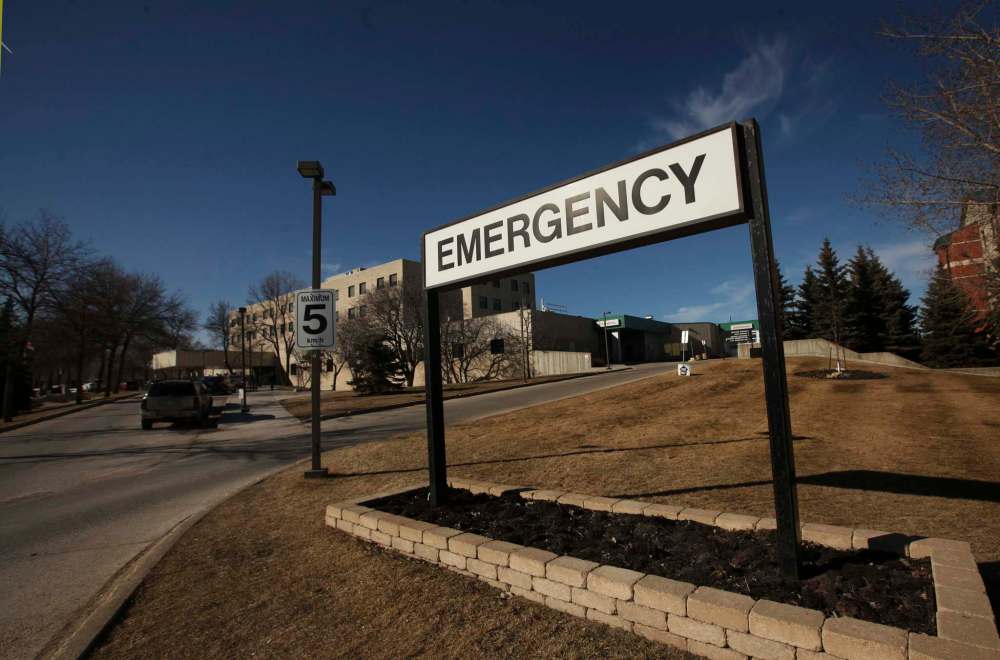Health reform hitting hard
ER closures leave staff, communities in critical condition, unions, Opposition say
Advertisement
Read this article for free:
or
Already have an account? Log in here »
To continue reading, please subscribe:
Monthly Digital Subscription
$0 for the first 4 weeks*
- Enjoy unlimited reading on winnipegfreepress.com
- Read the E-Edition, our digital replica newspaper
- Access News Break, our award-winning app
- Play interactive puzzles
*No charge for 4 weeks then price increases to the regular rate of $19.00 plus GST every four weeks. Offer available to new and qualified returning subscribers only. Cancel any time.
Monthly Digital Subscription
$4.75/week*
- Enjoy unlimited reading on winnipegfreepress.com
- Read the E-Edition, our digital replica newspaper
- Access News Break, our award-winning app
- Play interactive puzzles
*Billed as $19 plus GST every four weeks. Cancel any time.
To continue reading, please subscribe:
Add Free Press access to your Brandon Sun subscription for only an additional
$1 for the first 4 weeks*
*Your next subscription payment will increase by $1.00 and you will be charged $16.99 plus GST for four weeks. After four weeks, your payment will increase to $23.99 plus GST every four weeks.
Read unlimited articles for free today:
or
Already have an account? Log in here »
Hey there, time traveller!
This article was published 07/04/2017 (3175 days ago), so information in it may no longer be current.
Hundreds of emergency room workers had no clue Friday where — or if — they’ll be working in a few months.
“Nobody knows,” said an exasperated Michelle Gawronsky, president of the Manitoba Government and General Employees Union. “I’ve talked to other unions — we haven’t been consulted.”
There was plenty of uncertainty to go around after the Winnipeg Regional Health Authority and the provincial government announced a massive overhaul of health-care service delivery in the city over the next couple of years, including cutting the number of emergency rooms in half the consolidation of emergency care and general surgery to Health Sciences Centre, St. Boniface General Hospital and Grace Hospital.

ERs at Victoria and Seven Oaks hospitals are being transitioned to urgent-care centres for patients requiring care for serious, but not life-threatening, injuries and illnesses. Concordia’s emergency department will be closed.
The massive changes, which the health authority and province believe will cut wait times, streamline services and save money, were recommended in a report from a review of the system commissioned by the previous NDP government.
But Nova Scotia consultant David Peachey’s mandate did not include finding reasons to close three of the city’s six emergency departments NDP health critic Matt Wiebe said.
“This is a punch in the gut for those communities,” said the MLA for the Concordia, adding he lives four minutes away from the hospital of the same name, but 25 minutes from St. Boniface.
“There’s ways to improve emergency care… closing ERs isn’t the way to do it. This is absolutely devastating news for families who depend on this care in their communities… to the average Manitoban, they’re going to look up and see the big H, (and think) this is where I go. This is a total blow to them.”
Governments should listen to the experts they hire but must also balance that advice with the needs of communities, he said.
Gawronsky said staff in the three ERs being closed are among the MGEU’s 16,000 members, many of whom were asking questions she couldn’t answer Friday: whether they’ll have jobs, where they’ll work and what they’ll be doing.
“They don’t have layoff protection, and that’s as front-line as you’re going to get,” she said.
The WRHA said job losses will be kept to a 15 per cent cut in management positions.
“We believe there will be jobs for everyone who wants one,” the WRHA said in a statement. There will be movement throughout the system. Some positions will be deleted and some will be moved to different sites, but any front-line staff person who wishes to remain with the WRHA will be able to do so.”
The Canadian Union of Public Employees called Friday’s moves short-sighted, and asked what Premier Brian Pallister will do next to cut health care in the province.
Closing ERs “could potentially put public safety at risk, and is sending a shock-wave of uncertainty amongst the province’s health care workers,” CUPE said in a news release.
Manitoba’s Liberal party issued a statement calling on the province to develop a comprehensive health-care plan that pays special attention to rural areas and the North.
The Liberals said there should be simulations and trial ER closures to gauge the impact — including preparation for large-scale medical emergencies with many casualties — and much greater use of technology to connect specialists with outlying hospitals.
Twylla Krueger, executive director of the Seven Oaks General Hospital Foundation, said it’s far too early to know how the changes will affect different areas of the city.
“There just isn’t enough information understand what the impacts will be. I think it’s far too preliminary, and there are too many outstanding questions about specifics to provide any type of comment on the impact this will have on the Seven Oaks community,” Krueger said.
nick.martin@freepress.mb.ca
History
Updated on Saturday, April 8, 2017 7:29 AM CDT: Headline changed.





